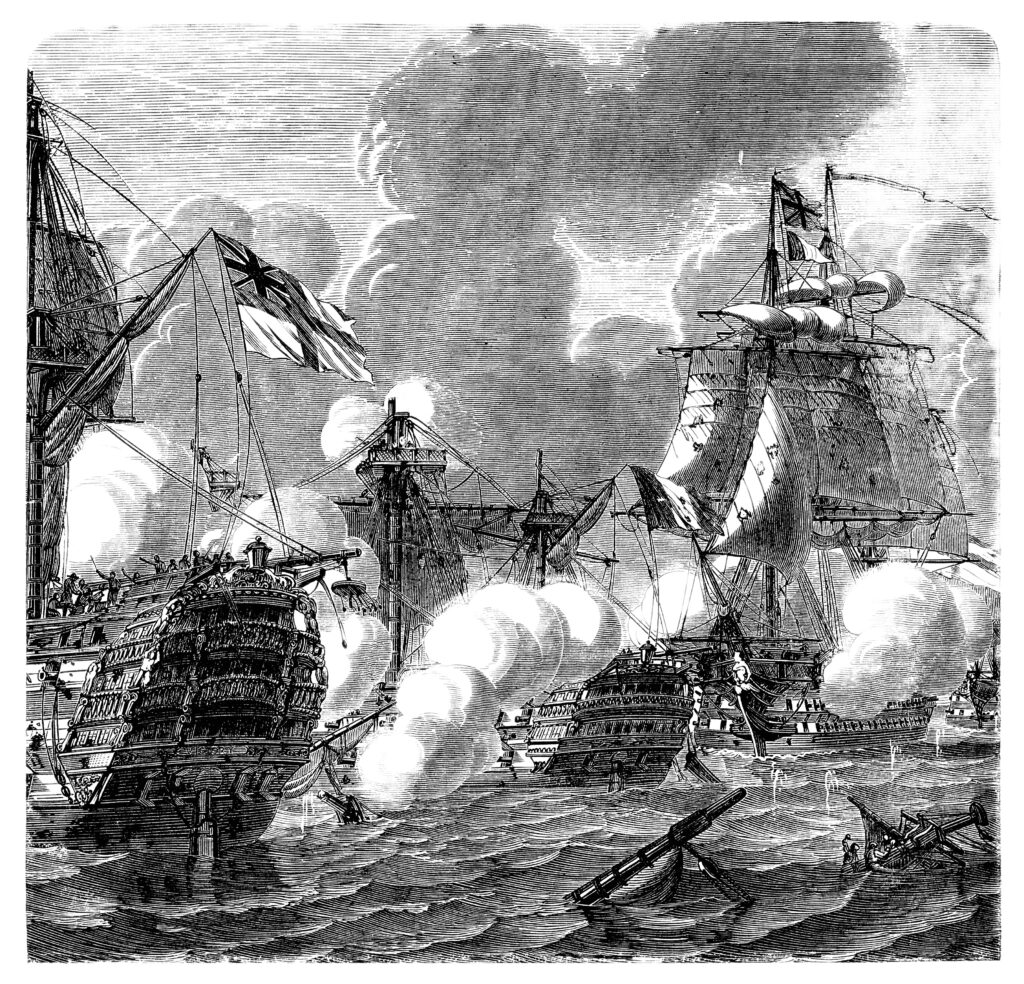Todays marks the 216th anniversary of the Battle of Trafalgar, a key engagement in the Napoleonic Wars and one which would mark the beginning of a British naval dominance that would last for more than a century.
This remarkable battle has since been considered one of the most decisive naval battles in history, and it sealed Lord Horatio Nelson’s fate as one of the most legendary admirals of all time, if not the greatest of all.
The Background
The year is 1805, the date, October 21st. At the swirling seat of Cape Trafalgar, two enormous navies lie on the precipice of history: the combined might of the Franco-Spanish navy, boasting 33 ships of the line, 5 frigates and 2 brigs manned by some 35,000 men, followed by the British navy’s 27 ships of the line, 4 frigates, a schooner and a cutter with their sailing force of 20,000.
Commanded by the French Admiral Villeneueve, the French and Spanish fleets were tasked with plans to take control of the English Channel to pave the way for Napoleon’s Grande Armée – a force of over 100,000 men – to invade Britain.
By now the War of the Third Coalition was already in full swing, with Lord Nelson and the Royal Navy having consistently thwarted Napoleon at sea despite French pre-eminence on the European mainland. Upon sighting the Franco-Spanish forces at a moment of weakness – Villeneuve had ordered his fleet to form a single line heading north – Nelson ordered his fleet to form two squadrons as they prepared to attack from the West. Sat astride the fabled HMS Victory, Lord Nelson signalled his famous message at 11:50am in a series of flags to give the order to engage:
“England expects that every man will do his duty.”
The Battle
Despite being outnumbered and outgunned, Nelson was far from outfoxed: his two columns sailed directly at the allied battle line’s flank with the aim of smashing it to pieces. Prior to engaging, Vice Admiral Cuthbert Collingwood, aboard his ship the Royal Sovereign, addressed his officers: “Now, gentlemen, let us do something today which the world may talk of hereafter.”
The plan worked to perfection. Nelson split the enemy fleet into three and isolating the rear half from Villeneuve’s flagship, the Bucentaure. While the allied vanguard sailed off in an attempt to turn, the British forces were granted a temporary numerical superiority. This was used to full advantage; in the ensuing melee, the Franco-Spanish forces were utterly devastated, losing 22 ships without the British losing a single one.
The Death of Nelson
The Victory, having been at the forefront of the British charge, was under considerable fire from the beginning. Sir Thomas Hardy, Nelson’s second-in-command aboard the ship, had urged Nelson to transfer to another ship to avoid the melee, but Nelson refused. At around 1.15pm amid the fracas, Lord Nelson was shot by musketfire from the mizzentop of the French ship Redoutable, which carried through his left shoulder and spine and lodged two inches below his right scapula in the muscles of his back. Noticing that Nelson was no longer by his side, Hardy rushed to find Nelson kneeling on the deck, wherein he smiled at his loyal friend and commander: “Hardy, I do believe they have done it at last… my backbone is shot through”.
Lord Nelson was then carried below decks, where he was attended to by ship surgeon William Beatty. Draping a handkerchief over his face to avoid causing alarm amongst his men, Nelson turned to the surgeon and sombrely proclaimed, “You can do nothing for me. I have but a short time to live.”
Hardy made his way belowdecks at around half-past-two, informing the Vice-Admiral that a number of enemy ships had surrendered and the day was won. Nelson reminded him, “take care of poor Lady Hamilton. Kiss me, Hardy.” The surgeon, Beatty, recorded that Hardy had dutifully knelt and kissed Nelson on the cheek and forehead, “Who is that?” Nelson had exclaimed, and, upon hearing that it was Hardy, replied “God bless you, Hardy”.
By 4.30pm in the afternoon, three full hours after being shot, Nelson was very weak. He was heard to declare “Thank God I have done my duty” before closing his eyes for a final time. Contrary to popular legend, with the last of his breath, his last words were recorded as “God and my country”.
The Aftermath
Ultimately, Trafalgar mattered little in the course of the wider War of the Third Coalition; however, it was a momentous occasion in terms of Britain’s naval supremacy and would pave the way for the Pax Britannica that was to ensue after Napoleon’s defeat.
To this day it remains one of the greatest naval victories of all time.


Recent Comments